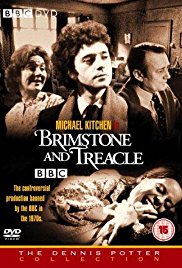 This is the Holy Grail for Dennis Potter fans, the original television version of BRIMSTONE AND TREACLE that was banned for years by the BBC. A deeply subversive essay on the allure—and possible beneficial effects—of evil, it’s a dark and provocative treat headlined by the one and only Devil Himself.
This is the Holy Grail for Dennis Potter fans, the original television version of BRIMSTONE AND TREACLE that was banned for years by the BBC. A deeply subversive essay on the allure—and possible beneficial effects—of evil, it’s a dark and provocative treat headlined by the one and only Devil Himself.
All true cult movie/TV buffs should be intimately familiar with the work of British scribe Dennis Potter. The immortal Potter conceived miniseries THE SINGING DETECTIVE is required viewing for all connoisseurs of the bizarre (though you can safely skip the recent movie version), as are the Potter scripted films DREAMCHILD and TRACK 29. Most Potter fans unfortunately know of BRIMSTONE AND TREACLE, arguably the author’s darkest work, only through the 1982 film adaptation with Sting in the lead role. While not a bad film, it’s padded by about fifteen minutes (its running time is 87 minutes, as opposed to the original’s more economical 72) and overall pales in light of the 1976 BBC incarnation.
Unfortunately, until very recently few have had a chance to see BRIMSTONE AND TREACLE in its intended version due to narrow minded censors; Alasdair White, the BBC’s then head of programming, branded it “brilliantly written and made, but nauseating.” Years later the ban was lifted for an August 1987 showing, but the channel’s higher ups still voiced concerns. BBC correspondent Gerald Priestland claimed that while he didn’t agree with the ban he could “imagine several groups of people who will be very upset by it, particularly carers for the mentally handicapped, women who do not believe in the therapeutic value of rape and people who believe very firmly in the value of prayer.”
In any event BRIMSTONE AND TREACLE is now available on DVD (in PAL format), so viewers will at last be able to judge the film’s merits on their own…as they should have been allowed to in the first place.
The film begins with a quote from Kierkegaard: “There resides infinitely more good in the demonic than in the trivial man.” Martin, a devilish (pun intended!) young man, stands in a doorway watching the passerby, wondering “which one will it be?” He manages to ensnare Tom Bates, a seemingly normal middle aged man who together with his long suffering wife Amy cares for their brain damaged daughter Pattie. Martin claims to be an old friend of Pattie’s and so manages to worm his way into the Bates household, where’s he’s free to molest the paralyzed girl whenever her parents leave the room.
Of course, Martin must convince Tom and Amy that he’s an upstanding, religious minded young man—the opposite, in other words, of his true nature. Indeed, it’s not long before we learn Martin’s real identity: Satan, the one and only Prince of Darkness. Much time is spent detailing Martin/Satan’s charming of Amy, who proves to be quite susceptible to his kind manner. The gruff Tom is more difficult to charm, but cracks during a drunken conversation during which Martin encourages Tom’s racist, xenophobic politics.
As it turns out, all three characters—and the audience—are in for a shock when Martin attempts a final rape of Pattie. It turns out to be a decidedly faithful night, as Pattie undergoes some radical changes and a long buried secret is revealed…
The best thing I can say about the direction by Barry Davis is that it imparts a powerful air of claustrophobia and apprehension, and, even better, respects the writing of Dennis Potter, the real star of the piece. The lengthy, ever-present dialogue (there’s a reason this is called a television play) may take some getting used to from viewers (like me) weaned on visual storytelling, but is about as fine as can be imagined, superbly illuminating the characters’ various idiosyncrasies and conjuring quite a few provocative moral quandaries.
Excellent work is also done by the actors: the late Denholm Elliott (who reprised his role in the 1982 version) and Patricia Lawrence are so convincing as a stuffy British couple that I’m having trouble disbelieving these actors must have been the same way offsreen. Michael Kitchen’s work as the Prince of Darkness is equally fine, played with a manic yet deeply sinister glee that, much like the film itself, still manages to startle after nearly thirty years.
Vital Statistics
BRIMSTONE AND TEACLE (a.k.a. PLAYS FOR TODAY: BRIMSTONE AND TEACLE)
BBC Worldwide Ltd.
Director: Barry Davis
Producer: Kenith Trodd
Screenplay: Dennis Potter
Cinematography: Peter Barlett
Editor: Tony Woollard
Cast: Michael Kitchen, Denholm Elliott, Patricia Lawrence, Michelle Newell, Paul Williamson, Esmond Webb, Patricia Quayle, James Greene
